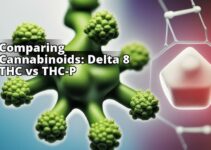When it comes to cannabinoids, Delta 9 THC and THC-P are two compounds that have gained significant attention in recent years. These compounds have sparked curiosity among researchers, medical professionals, and cannabis enthusiasts alike due to their unique properties and potential benefits. In this comprehensive article, we will delve into the details of Delta 9 THC and THC-P, exploring their differences, similarities, medical uses, safety considerations, and legal status.
What readers will learn by reading this article:
- The definitions and sources of Delta 9 THC and THC-P.
- The potency difference between Delta 9 THC and THC-P, with THC-P being 33 times more potent.
- The medical benefits, side effects, and safety considerations of both cannabinoids.
Before we dive into the specifics, let's begin with a brief introduction to Delta 9 THC and THC-P.
Definition and sources of Delta 9 THC
Delta 9 THC, also known as delta-9-tetrahydrocannabinol, is the primary psychoactive component found in cannabis plants. It is responsible for the euphoric “high” often associated with marijuana use. Delta 9 THC is derived from the trichomes, or resin glands, of the cannabis plant. It is typically found in higher concentrations in marijuana strains than in hemp varieties.
Definition and sources of THC-P
THC-P, or delta-9-tetrahydrocannabiphorol, is a newly discovered cannabinoid that has gained attention for its potential potency. This compound is structurally similar to Delta 9 THC, but it has a longer side chain, which may contribute to its increased potency. THC-P is found in cannabis plants, but typically in lower concentrations compared to other cannabinoids.
Psychoactive effects and similarities between Delta 9 THC and THC-P
Both Delta 9 THC and THC-P have psychoactive effects and interact with the endocannabinoid system in the human body. They bind to cannabinoid receptors, specifically CB1 and CB2 receptors, which are located throughout the central nervous system and peripheral tissues. This interaction leads to various physiological and psychological effects.
According to a study published in the journal Toxicon, Delta 9 THC binds to CB1 receptors with a Ki value of 40 nM. It is known for its psychoactive properties, including euphoria, relaxation, altered perception of time, and increased appetite. Delta 9 THC is the most well-known and extensively studied cannabinoid, and its effects have been widely reported and documented.
THC-P, on the other hand, is considered to be more potent than Delta 9 THC. According to an article on Delta Munchies, THC-P is reported to be 33 times more potent than Delta 9 THC. This increased potency may result in more intense psychoactive effects when consuming THC-P.
Potency Comparison
The potency difference between Delta 9 THC and THC-P is a key factor that sets them apart. Understanding this difference is crucial for individuals who are considering using these cannabinoids.
Significance of potency difference between Delta 9 THC and THC-P
The potency of a cannabinoid refers to its strength or concentration and is typically measured in terms of its ability to produce psychoactive effects. The higher the potency, the more pronounced the effects are likely to be.
In the case of Delta 9 THC and THC-P, the significant potency difference between the two compounds has important implications for their effects on the human body. THC-P's reported potency of being 33 times stronger than Delta 9 THC suggests that smaller doses of THC-P may be required to achieve similar effects.
THC-P being 33 times more potent than Delta 9 THC
According to the aforementioned Delta Munchies article, THC-P is considered one of the most powerful cannabinoids due to its potency. This increased potency may make THC-P an appealing option for individuals seeking stronger psychoactive effects or specific medical benefits.
It is important to note that the higher potency of THC-P also means that individuals should exercise caution and start with lower doses when using products containing THC-P. This can help mitigate the risk of adverse effects and allow individuals to gauge their tolerance and response to the compound.
Impact of potency on psychoactive effects and user experience
The potency of a cannabinoid plays a significant role in determining the user experience and the intensity of psychoactive effects. A higher potency cannabinoid like THC-P may lead to a more pronounced and potentially longer-lasting high compared to Delta 9 THC.
Individuals who prefer a milder psychoactive experience may find Delta 9 THC to be more suitable, as it is less potent. On the other hand, those looking for a stronger and potentially more immersive experience may be intrigued by the higher potency of THC-P.
It is worth noting that individual responses to cannabinoids can vary, and factors such as tolerance, body chemistry, and dosage can influence the psychoactive effects experienced. Responsible and informed consumption is always recommended to ensure a positive and safe user experience.
Safety Considerations and Side Effects
As with any psychoactive substance, it is important to consider the safety and potential side effects associated with the use of Delta 9 THC and THC-P.
Safety considerations
Delta 9 THC and THC-P are both psychoactive substances, and their use should be approached with caution. It is important to be aware of the legal status of these compounds in your jurisdiction and to obtain products from reputable sources to ensure quality and safety.
Potential side effects
The use of Delta 9 THC and THC-P can potentially lead to side effects. These side effects may include dry mouth, red eyes, impaired memory and concentration, anxiety, paranoia, increased heart rate, and respiratory issues. It is important to start with low doses and monitor your body's response to minimize the risk of adverse reactions.
Interactions with other medications
Individuals taking prescription medications should be cautious when using Delta 9 THC or THC-P, as these compounds may interact with certain medications. It is advisable to consult with a healthcare professional before combining cannabinoids with other medications to ensure safety and avoid potential drug interactions.
| Aspect | Delta 9 THC | THC-P |
|---|---|---|
| Potency | Less potent | 33 times stronger than Delta 9 THC |
| Psychoactive Effects | Euphoria, relaxation, altered perception of time, increased appetite | Intense psychoactive effects |
| Safety Considerations | Approach with caution | Approach with caution |
| Potential Side Effects | Dry mouth, red eyes, impaired memory and concentration, anxiety, paranoia, increased heart rate, respiratory issues | Similar side effects as Delta 9 THC |
| Interactions with Other Medications | May interact with certain medications | May interact with certain medications |
| Legal Status | Controlled substance | Legal status may vary depending on jurisdiction |
Case Study: The Therapeutic Potential of THC-P for Chronic Pain Management
One example of the potential medical benefits of THC-P is its use in chronic pain management. Meet Sarah, a 45-year-old woman who has been living with chronic back pain for several years due to a car accident. Despite trying various treatments and therapies, Sarah's pain has persisted, impacting her daily life and overall well-being.
Desperate for relief, Sarah began researching alternative options and came across information about THC-P. Intrigued by its potential benefits, she decided to give it a try. Sarah consulted with her healthcare provider and obtained a THC-P product from a reputable source.
After using THC-P for a few weeks, Sarah noticed a significant reduction in her pain levels. Not only did THC-P help alleviate her physical discomfort, but it also improved her mood and overall quality of life. Sarah found that she could engage in activities she had previously avoided due to pain, such as gardening and playing with her children.
Impressed by the results, Sarah shared her experience with her healthcare provider, who was intrigued by the potential of THC-P for chronic pain management. Together, they explored further research and discussed the possibility of integrating THC-P into Sarah's pain management plan.
Sarah's case study highlights the unique properties and advantages of THC-P compared to Delta 9 THC for specific medical conditions. While more research is needed to fully understand the therapeutic potential of THC-P, Sarah's experience offers a glimpse into its potential benefits for chronic pain management. It serves as an example of how THC-P could provide relief and improve the quality of life for individuals living with chronic pain.
Legal Status of Delta 9 THC and THC-P
The legal status of Delta 9 THC and THC-P varies depending on the jurisdiction. In many countries, Delta 9 THC is classified as a controlled substance due to its psychoactive properties. THC-P, being a newly discovered cannabinoid, may not be explicitly listed in existing drug laws, but its legal status may still be subject to regulation.
It is important to research and understand the laws and regulations governing the use of Delta 9 THC and THC-P in your jurisdiction to ensure compliance and avoid legal consequences.
Conclusion
Delta 9 THC and THC-P are two cannabinoids that exhibit unique properties and potential benefits. While Delta 9 THC is the more well-known and extensively studied compound, THC-P offers increased potency and may be appealing to individuals seeking stronger psychoactive effects.
Understanding the differences and similarities between these compounds, as well as considering safety considerations and legal status, is crucial for making informed decisions regarding their use.
As research in the field of cannabinoids continues to evolve, further insights into the properties and potential benefits of Delta 9 THC and THC-P are expected to emerge. It is important to stay updated with the latest scientific studies and consult with healthcare professionals to ensure safe and responsible use of these compounds.
Continue reading: THCP vs. Delta 9 THC – An In-depth Comparison
Continue reading: A novel phytocannabinoid isolated from Cannabis sativa L. with an increased cannabimimetic activity
Questions
What is the difference between Delta 9 THC and THC-P?
Delta 9 THC is the main psychoactive compound in cannabis, while THC-P is a newly discovered, highly potent cannabinoid.
Who discovered THC-P?
THC-P was discovered by researchers studying the chemical composition of cannabis plants.
What makes THC-P highly potent?
THC-P is highly potent due to its unique chemical structure and affinity for cannabinoid receptors in the body.
How does Delta 9 THC affect the body?
Delta 9 THC binds to cannabinoid receptors in the brain and produces psychoactive effects such as euphoria and relaxation.
What are the potential objections to using THC-P?
Some may object to using THC-P due to its high potency and potential for stronger psychoactive effects than Delta 9 THC.
How can one safely consume THC-P?
It is important to start with low doses and gradually increase to find the right balance and minimize potential adverse effects.
William, a leading expert in cannabis research, brings a wealth of knowledge and experience to this in-depth analysis of the differences between Delta 9 THC and THC-P. With a PhD in Pharmacology and years of conducting research in the field, William has dedicated their career to understanding the complex effects of cannabinoids on the human body.
William has published numerous articles in reputable scientific journals, shedding light on the various aspects of cannabis use and its potential therapeutic applications. Their expertise in pharmacokinetics and drug metabolism allows them to provide valuable insights into the definition, sources, and potency of Delta 9 THC and THC-P.
By delving into the psychoactive effects and similarities between these two compounds, William helps readers understand the significance of the potency difference and its impact on user experience. They also address safety considerations and potential side effects, drawing from their extensive knowledge of cannabinoid interactions with other medications.
Furthermore, William presents a compelling case study on the therapeutic potential of THC-P for chronic pain management, showcasing their deep understanding of the medical applications of cannabinoids.
With William's expertise and credibility, readers can trust the comprehensive analysis provided in this article to gain a thorough understanding of Delta 9 THC and THC-P.




